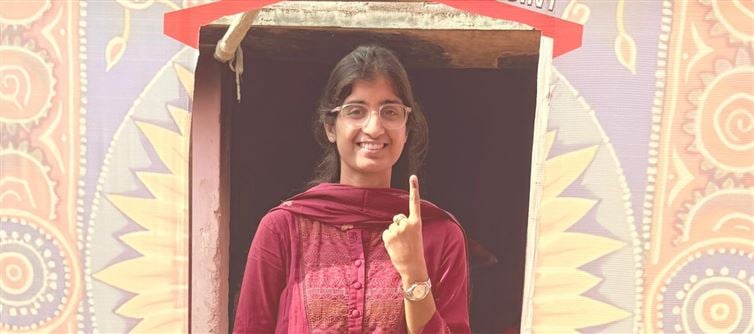
From Protector to Performer
There was a time when the Election Commission of india (ECI) wrapped itself in the shawl of moral dignity. When journalists, activists, and even political leaders demanded transparency by requesting CCTV footage of polling booths, the Commission refused. Their reasoning?
“It would compromise the izzat of Bahu and Betis seen on camera.”
A deeply emotional argument — the kind that makes you pause. Respect for women, dignity, and privacy. Fair enough.
But fast-forward to today, and the same ECI, from its official social media handle, proudly posts a selfie of a young woman voter, violating the very principle it once claimed to defend.
So, what changed? The women? The values? Or the integrity of the Commission itself?
The izzat Excuse: A Convenient Shield
The ECI’s refusal to release polling booth CCTV footage wasn’t just a bureaucratic decision — it was a moral high ground moment.
By invoking the “izzat of Bahu and Betis,” it painted itself as the guardian of indian womanhood, shielding women from public gaze in the name of decency.
But scratch beneath the rhetoric, and it was clear: this wasn’t about dignity — it was about dodging scrutiny. The footage wasn’t withheld to protect privacy; it was withheld to protect the system from exposure.
When irregularities and vote manipulations were being whispered about, when opposition parties demanded transparency, the ECI conveniently played the moral card. It wasn’t protecting women — it was protecting itself.
The Selfie Scandal: When Ethics Became Optics
Now, the same institution that claimed cameras would “violate dignity” is parading women voters online for likes and retweets.
The official ECI handle posts a young woman’s voting selfie — a personal image, publicly shared by a government body — with zero hesitation.
Where did the sacred concern for privacy go?
Where did the “izzat of Betis” vanish?
The hypocrisy is staggering.
It’s no longer about ethics — it’s about optics. The ECI isn’t safeguarding women; it’s using them as props in its social media narrative. The same “Beti” whose modesty was supposedly at risk during CCTV viewing is now a poster girl for PR engagement.
The Rot Beneath the Respect
This isn’t just about one selfie. It’s about a pattern of selective morality, of moral shields raised only when convenient, and lowered when attention and applause are at stake.
The ECI has positioned itself as a brand, not a constitutional body. Its social feeds look more like marketing campaigns than updates from a watchdog of democracy.
It’s not just tone-deaf — it’s dangerous.
Because once the moral high ground is used as a weapon of convenience, it loses all value. The phrase “izzat of Bahu and Betis” becomes an empty shield, wielded only when transparency threatens power.
The Larger Question: Who Protects Democracy’s Izzat?
In a nation that prides itself on democracy, the ECI was meant to be sacred — neutral, fearless, untouchable by politics. But now, it stands accused of the very thing it should resist — double standards.
If CCTV footage threatens privacy, why doesn’t the public sharing of women’s images?
If izzat was the reason for secrecy, why is it not the reason for restraint today?
The answer is bitterly clear: because this time, it benefits them.
The Bottom Line: Moral Authority Cannot Be Selective
You can’t preach dignity on monday and post selfies on Friday.
You can’t hide behind the “izzat of women” when questioned and then use women as social media content when convenient.
The ECI once represented credibility. Now, it represents a contradiction.
india deserves an election commission that protects democracy’s soul, not one that poses for it.




 click and follow Indiaherald WhatsApp channel
click and follow Indiaherald WhatsApp channel